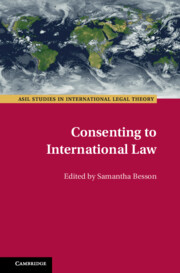Book contents
- Consenting to International Law
- ASIL Studies in International Legal Theory
- Consenting to International Law
- Copyright page
- Contents
- Contributors
- Preface
- Consenting to International Law
- Part I Notions and Roles of Consent
- Part II Objects and Types of Consent
- Part III Subjects and Institutions of Consent
- 11 The Consent of International Organizations in the Making of General and Conventional Rules of International Law
- 12 Consent and Informal Law-Making
- 13 Consent as a Guarantee of the Democratic Legitimacy of International Law
- 14 From Equal State Consent to Equal Public Participation in International Organizations
- 15 Autonomy in International Law
- Index
12 - Consent and Informal Law-Making
The View from the Court of Justice of the European Union
from Part III - Subjects and Institutions of Consent
Published online by Cambridge University Press: 23 November 2023
- Consenting to International Law
- ASIL Studies in International Legal Theory
- Consenting to International Law
- Copyright page
- Contents
- Contributors
- Preface
- Consenting to International Law
- Part I Notions and Roles of Consent
- Part II Objects and Types of Consent
- Part III Subjects and Institutions of Consent
- 11 The Consent of International Organizations in the Making of General and Conventional Rules of International Law
- 12 Consent and Informal Law-Making
- 13 Consent as a Guarantee of the Democratic Legitimacy of International Law
- 14 From Equal State Consent to Equal Public Participation in International Organizations
- 15 Autonomy in International Law
- Index
Summary
The author explores how the Court of Justice of the European Union (hereafter CJEU) has dealt with issues of consent as a trigger of commitment in the context of treaty-making by focusing on its practice pertaining to informal arrangements concluded between the European Union and third parties. The main arguments advanced in the chapter are: (a) that the Court has largely followed mainstream international legal thinking by identifying consent as the ‘objective’ common intention of its authors to be legally bound; and (b) that the Court has acknowledged the constitutive function of consent when it comes to treaty-making with non-State actors. The chapter also illustrates an important blind spot in the current debate on consent. The examination of the CJEU’s case law shows that political factors may have a bearing on the ascertainment of the consent to be legally bound. This, in turn, entails that attempts at theorizing how international law can remain sociologically clever and keep pace with current developments on the ground should be cognizant of the danger of over-relying on judicial practice.
Keywords
- Type
- Chapter
- Information
- Consenting to International Law , pp. 274 - 295Publisher: Cambridge University PressPrint publication year: 2023

